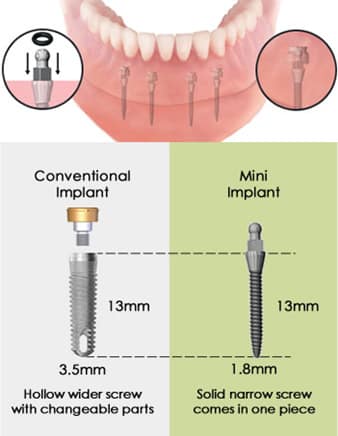Dental implants have the highest success rate of any teeth replacement option on the market today. Unfortunately, some patients do not qualify for traditional implants, due to bone deficiency. Fortunately, mini dental implants now make it possible for patients lacking jawbone density to replace teeth in a stable and secure fashion.

What are Mini Dental Implants?
Like their traditional counterparts, mini dental implants are crafted from titanium and can vary in length. However, the diameter is about half the size when compared to a standard dental implant. This is especially useful for cases in which the patient has lost significant bone width. Mini dental implants can be successfully placed in areas too narrow for a conventional implant.
The primary use of mini implants today is to support and stabilize a denture. Many patients who have worn conventional dentures for an extended length of time experience jawbone recession. Over time, this bone loss can lead to an ill-fitting denture that shifts and slides out of place when eating or speaking.
Dental implants can be used to stabilize the denture, providing a more secure fit. In the past, patients with significant bone loss were unable to receive traditional implants. Thankfully, mini dental implants now increase treatment eligibility for patients who did not previously qualify for traditional implants.
Are you a candidate for mini-implants?
The only way to know if you qualify for mini dental implants is to schedule a visit with Dr. Whalen. During a thorough assessment, we will take scans and x-rays to evaluate the health of your underlying bone. Your complete medical history will also be discussed at length to ensure there are no contraindications.
How are Mini Dental Implants Placed?
One of the most appealing aspects of mini dental implants is that they are minimally-invasive. Oftentimes, the procedure can be performed in less than an hour using local anesthesia. Typically, stitches are not required following the placement of mini implants. As a result, most patients experience little to no discomfort after their procedure.
Faster Treatment Timeline than Traditional Implants
Traditional dental implant require several months of healing before a restoration can be attached. A major advantage of mini dental implants is that typically, the restoration can be connected on the same day as the surgery. This provides unparalleled convenience for our patients.
Mini Dental Implant Maintenance
Like conventional implants, mini dental implants can function just like your natural teeth. In addition to attending routine dental exams and cleanings, it is important to adopt proper brushing and flossing techniques to practice between your dental appointments. Our team can demonstrate effective methods for cleaning around dental implants so you can keep your smile beautiful and healthy.
